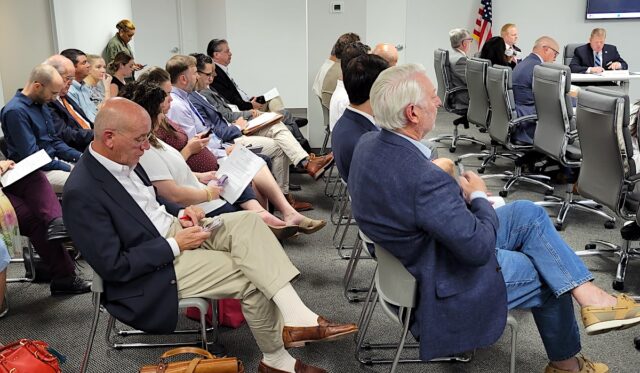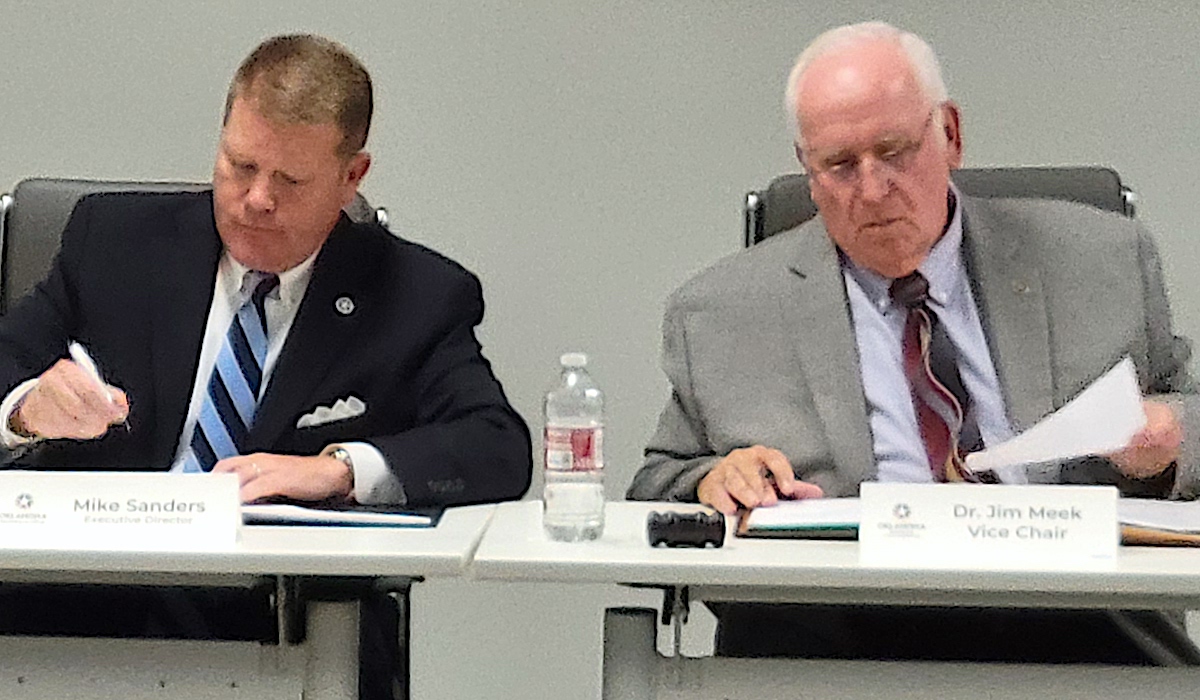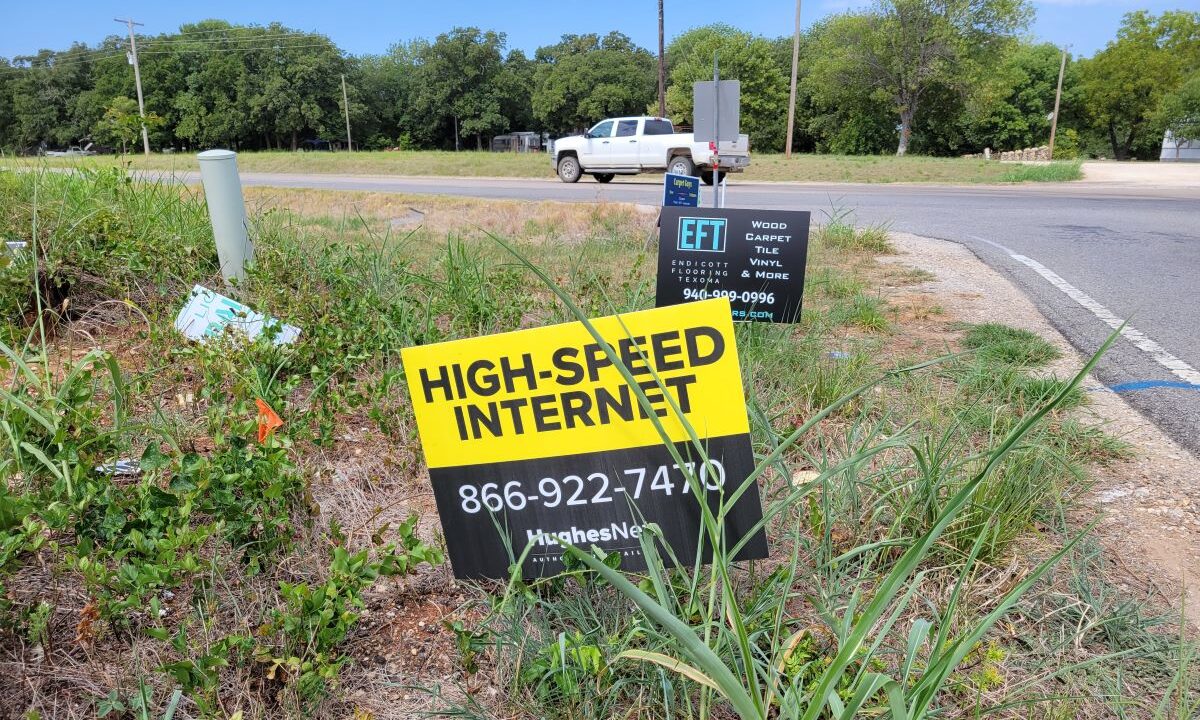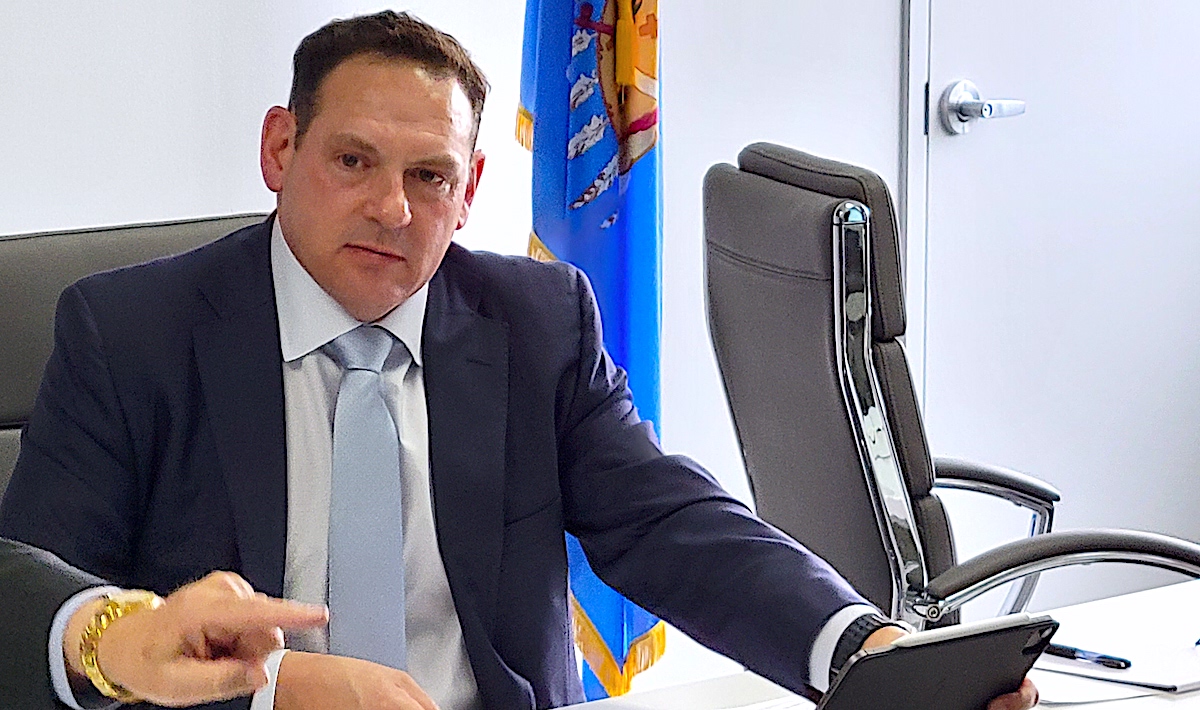
After hearing complaints for months from internet service providers, growing concerns from its governing board members and recent suggestions from the Office of the Attorney General, the Oklahoma Broadband Office is tossing out its list of proposed broadband projects to be considered for an initial allocation of $382 million in American Rescue Plan Act funds.
The OBO announced late Friday that it is dialing up a new application process for companies to submit new and updated projects to expand broadband access to the estimated 728,000 Oklahomans who lack dependable high-speed internet access. The new application is expected to be revealed in September.
Executive director Mike Sanders said Friday that a review of the previously proposed projects and supplemental inquiries showed that some of the state’s most challenging geographical areas would not be serviced under the OBO’s original criteria adopted in July.
Those criteria had involved simply selecting projects from a previous batch of proposals submitted through the state of Oklahoma’s ARPA portal in 2021 and 2022. As outlined on the Broadband Office’s website in July, that list of projects featured divergent descriptions and project details that may have fallen out of date over the past year as the new state agency struggled to take shape.
“There were a lot of different areas of the state that were not being covered,” Sanders said. “Some information that we asked some of our ISPs to provide, they didn’t submit as much information as they needed, and it got to be confusing.”
A former Oklahoma legislator from Kingfisher, Sanders was hired in March and tasked with expediting the allocation of more than $1 billion in federal funding for broadband expansion. Other states have made significantly more progress distributing their federal funds.
“We’re hopeful that other companies will apply for these very challenging geographical areas that need to be serviced, because I’ve always felt that, regardless if you live in a community that has 250 people, you should have every ability and right to have the same service as a community that has 250,000 people,” Sanders said. “We’re hopeful that this process will lend that to those particular players that want to serve those unserved areas, and we’re very cautiously optimistic that will happen.”
The OBO’s prior process for distributing the broadband-focused ARPA money is ending immediately, and the Office of the Attorney General is providing legal assistance as a new notice of funding opportunity is developed, Sanders said.
Last year, the Legislature allocated $382 million of the state’s share of ARPA funding to the OBO to fund various projects across the state. The ARPA money, which actually totals $374 million after federal administrative fees have been taken out, must be allocated by the end of 2024 and spent by the end of 2026.
Part of the problem is that the projects proposed through the state’s ARPA portal were submitted before the OBO was even formed to develop procedures. The proposed projects on the state’s ARPA list were not submitted as competitive grants, a key component of an administrative rule approved by the Broadband Governing Board in March. If the board had approved any of the ARPA projects from the legislative portal’s original list, it could have been seen as violating its own rules.
‘Prices go up, and that’s the downfall’
Friday’s decision to scrap the list of proposed projects becomes another speed bump in the Broadband Office’s efforts to ensure all Oklahomans have reliable and fast broadband connectivity.
In 2022, legislators enacted HB 3363 to create the Oklahoma Broadband Office. Its nine-member Broadband Governing Board is responsible for broadband expansion policy and overseeing the new agency.
Most of the board’s time this past year has been dedicated to setting up the office and hiring an executive director, which was pushed back nearly a month in March when the OBO’s governing board reconsidered an earlier choice and instead hired Sanders. He inherited an agency governed by a board that had made only one major funding decision: to send $20 million to the Department of Public Safety for a Motorola radio equipment upgrade.
Friday’s decision to reboot the project selection process came just days after the agency had narrowed the original list of 133 applicants — totaling more than $4 billion of potential projects — down to 90 applicants totaling $2.5 billion. A 10-day challenge period was announced about 11 p.m. Friday, Aug. 4. Several internet service providers complained about the short notice to challenge the projects, noting that the 10-day period included two weekends.
The 90 applicants had been advanced based on their ability to operate in underserved areas of the state, Sanders said.
“With the (U.S. Department of) Treasury’s input and with legislative intent, we want to do that last mile, which tends to be the most expensive portion of this buildout,” Sanders had said in July.
Now, the agency’s new ARPA grant process for broadband projects could start as soon as Sept. 13, he said. Administrative rules establishing the OBO’s Broadband Grant Program take effect Sept. 11, and the OBO’s governing board is scheduled to meet Tuesday, Sept. 12, to review and approve the application process.
“We want to make sure that our board has every bit of information and knowledge on that,” Sanders said.
Sanders acknowledged that this will create a delay in awarding broadband projects, but the new process could actually result in no significant delay, as it was possible litigation might have been filed if the projects had been awarded froom the original list.
“Prices go up, and that’s the downfall of this new process,” Sanders said. “We’ll have to move it back three, four months, but it’s better to do it right and answer all concerns and questions, and we feel this process does that.”
Legislative leaders who approved giving the ARPA money to the OBO are watching the process and are apprehensive about the time it is taken to move forward with broadband projects.
Senate Appropriations and Budget Chairman Roger Thompson (R-Okemah) said last month he is concerned about the distribution of funds to help provide high-speed internet to underserved and deprived areas in the state.
“I want to get that money out. I want to be able to use it,” he said. “Politics should not be involved in it. I want to make sure that simply because you’re a large company doesn’t mean that you’re a bad person, that you still may be able to serve underserved areas, but I don’t want any duplicate areas. If you’re a small company, that does not necessarily mean you’re the best person. How do we serve the people of Oklahoma?”
Figuring out ‘the spirit of this program’

About 20 representatives from internet service providers attended the Aug. 8 meeting of the Oklahoma Broadband Governing Board, its first since the OBO posted its list of potential ARPA projects. It was the largest crowd in several months to attend a meeting of the board.
Johnny Moyer, director of the Plano, Texas, office of Altice USA, was the only person to address the board during its public comment period. He told board members the existing applications did not provide enough information, such as service addresses and geographic information, in order to challenge them.
RELATED
As Broadband Board chairman, Mike Fina pushed $20 million Motorola project with college roommate by Michael McNutt & Tres Savage
“We have basic concerns with the ongoing ARPA process,” said Moyer, whose Optimum service provides internet to dozens of communities from Weatherford to Poteau. “There is a significant portion of our network that is deemed served by the FCC that would be overbuilt. That goes against the spirit of this program.”
Other internet service providers have questioned the list of projects for months.
During a meeting May 22 in Oklahoma City to gather public comments, Gus Sanchez, a senior government account executive with T-Mobile, said the OBO should reopen the bidding process for the ARPA funds. He argued that technological advances have occurred since the state’s ARPA portal opened, making services such as 5G wireless more practical and more cost-efficient.
“When this plan was put together, 5G hadn’t matured,” Sanchez said in May. “If the goal is to deliver as quickly as possible to the citizens, there are better ways and more cost-effective ways.”
Asked about the possibility of reopening the process to seek proposals, Sanders expressed hesitation back in May.
“When you open it up, then what happens is those who had played by the rules and got it in by the time they were asked, that puts us in a very precarious situation,” Sanders said in May. “I would have hoped that some of the folks that were interested should have done it when we asked them to do it.”
But internet service provider representatives said information was lacking during the state’s original call for ARPA proposals, and they pointed out that the deadline to make an application expired before the OBO was even established.
The state opened the ARPA portal on Oct. 1, 2021, to solicit ideas and projects for how federal ARPA funds could be spent. The ARPA portal closed on March 4, 2022, with 133 portal projects that were related to broadband service submitted.
In May 2022, the Legislature assumed control of ARPA decisions from Gov. Kevin Stitt and established its Joint Committee on Pandemic Relief Funding and various working groups, which met extensively last fall to review portal submissions and recommend ones to be funded.
But the ARPA portal had not asked any specific broadband-related questions of applicants, and no information was sought to avoid overbuilding or determine project feasibility. At the time, an accurate map depicting unserved or underserved areas did not exist. The OBO just launched its state map Aug. 1.
Fast Fact
Building broadband infrastructure and installing lines underground will be expensive. Estimates indicate it could cost up to $120,000 per mile to lay fiber in the granite found in many areas of southeast Oklahoma.
The recommendation from the broadband working group to the Joint Committee on Pandemic Relief Funding was to fund the OBO directly and have it award projects through its Broadband Grant Program. However, that grant program was not formally created by administrative rule until March 31. The BGP was among the OBO administrative rules sent to the Legislature and approved through SJR 22. However, those administrative rules only take effect Sept. 11.
The Broadband Grant Program is required to be a competitive grant program to expand access to broadband by focusing on unserved and underserved communities in both urban and rural areas.
“Four months ago, when I took this job, there wasn’t even high-speed internet in this office,” Sanders said.
Since then, the OBO has been adding staff, including a pair of compliance officers.
“When you’re talking about $1.3 billion in [funding], you’ve got to have your t’s and i’s crossed, just from the federal regulation side of things,” he said. “We are now in a position as a functioning, fully operational state agency. We started from scratch. We really started from behind the curveball, but I’m so proud of my team and the processes that we put in place, because we’re going to succeed.
“Our mission is to deliver high-speed internet, and we’re going to do it.”
Reliance on ARPA portal ‘largely backward-looking’

During Tuesday’s meeting, Broadband Governing Board member Katy Boren suggested bringing in the attorney general to make sure members are following state statutes throughout the process.
“I want to do this right,” she said. “I want to make sure we as a board are given all information, with experts coming to talk to us, the attorney general to give us advice.”
Her concerns may have been prompted by an email sent to board members earlier that day by Rob Johnson, general counsel to Attorney General Gentner Drummond.
“The Office of the Attorney General received several contacts over the prior evening and this morning expressing concerns about the Broadband Grant Program and, specifically, which projects to consider in making ARPA grant awards,” Johnson wrote.
He also attached a copy of a memorandum from his office sent July 7 to OBO chief of staff Mike Robins, who had asked a month prior if it would be fair and reasonable for the OBO to create two classes of applicants for the ARPA funds. Robins suggested one class would include those who submitted applications through the 2021-2022 ARPA portal and the other would include those who did not apply through the portal but would provide service to regions of the state not covered by any of the portal applicants.
In the memo, Deputy Attorney General Niki Batt advised the Oklahoma Broadband Office not to proceed with its two-class proposal:
The OBO’s proposed two-class approach will likely subject it to criticism, if not litigation, because of the heavy focus on those applicants that submitted proposals through the ARPA portal. Reliance on the ARPA portal is largely backward-looking because applicants submitted projects or proposals to the state, prior to the creation of the OBO or the Oklahoma Broadband Expansion Act (…) This approach seemingly fails to provide notice of a funding opportunity to potential applicants. This lack of notice fails to ensure all potential applicants are on equal footing by outlining the technical and programmatic aspects of the project, as well as a defined timeline to submit applications.
However, the OBO should consider merging the two classes to accomplish the same important goal of awarding grants to providers that will ensure unserved and underserved areas have access to highspeed broadband, and is able to do by the Dec. 31, 2024, deadline. To do so, the OBO would publish a funding opportunity announcement detailing the particulars of the specific grant program, the terms and conditions of the award, scoring criteria, etc.
Despite Batt’s memo to Robins and Sanders, the Broadband Governing Board voted four days later on July 11 to approve Sanders’ recommendation that the ARPA portal projects be considered first for funding.
Moving forward, Sanders said Friday that previous and new applicants can submit proposals in the new ARPA grant process.
“We think this is the cleanest, best process moving forward,” he said. “This should absolutely ease any concerns of some of the issues that may have been brought up. We are absolutely positive that this is the best move forward.”
Read the memo from Deputy Attorney General Niki Batt
https://nondoc.com/wp-content/uploads/2023/08/8-11-23-AG-memorandum.pdf” viewer=”google”](Update: This article was updated at 11:11 a.m. Wednesday, Aug. 16, to add an additional reference to when the new application process is expected to be posted by the Oklahoma Broadband Office.)






















